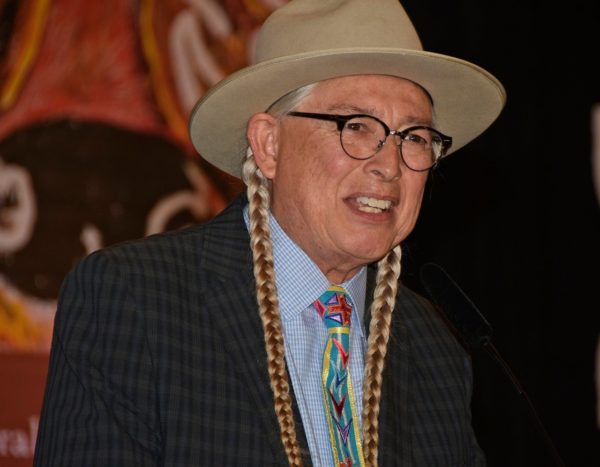
- Details
- By Native News Online Staff
LOS ANGELES — Native American legal scholar and author Walter Echo-Hawk (Pawnee) will discuss and read from his latest book, The Sea of Grass: A Family Tale from the American Heartland, on the campus of UCLA on Wednesday, Feb. 5, 2020 at 2 p.m.
Echo-Hawk is an eminent Native American speaker, author, attorney, and legal scholar who has worked on seminal and ground-breaking Native legal cases and issues. He is also the chairman of the board for the Association of Tribal Archives, Libraries and Museums. Echo-Hawk will discuss his extensive research and the importance of his Native American ancient roots to his storytelling about the real people whose lives were shaped by the land, animals and plants of his homeland.
“All peoples have roots that extend back in time, with powerful stories to tell about their ancestors,” Echo-Hawk said. “including Native Americans.”
Echo-Hawk will explain why he wrote The Sea of Grass, including how he gathered family history, and how he wrote this historical novel. Afterward, he will give selective readings. His talk will be of interest to scholars in contemporary Native American literature, indigenous culture, American Indian history, and creative writing—as well as students interested in researching family history and telling their ancestors' stories.
WHAT: Book discussion with author Walter Echo-Hawk
WHEN: Wednesday, February 5, 2020 at 2 p.m.
WHERE: Presentation Room, UCLA Charles E. Young Library, 280 Charles E Young Dr N, Los Angeles, CA 90095
This event is sponsored by the UCLA American Indian Studies Center in partnership with the UCLA Native Nation Law & Policy Center, with additional support from the UCLA AISC Library and UCLA.
Echo-Hawk’s next stop will be speaking at Sonoma State University on February 6, 2020 at 4:00 p.m. at the University Student Center, and then at University of California at Berkeley on February 21, 2020 in the Multicultural Community Center at 5:30 p.m.
More details can be found on his webpage at www.walterechohawk.com
More Stories Like This
Native News Weekly (August 25, 2024): D.C. BriefsUS Presidents in Their Own Words Concerning American Indians
Native News Weekly (December 14, 2025): D.C. Briefs
Wounded Knee Massacre Site Protection Bill Passes Congress
Two Murdered on Colville Indian Reservation
Help us defend tribal sovereignty.
At Native News Online, our mission is rooted in telling the stories that strengthen sovereignty and uplift Indigenous voices — not just at year’s end, but every single day.
Because of your generosity last year, we were able to keep our reporters on the ground in tribal communities, at national gatherings and in the halls of Congress — covering the issues that matter most to Indian Country: sovereignty, culture, education, health and economic opportunity.
That support sustained us through a tough year in 2025. Now, as we look to the year ahead, we need your help right now to ensure warrior journalism remains strong — reporting that defends tribal sovereignty, amplifies Native truth, and holds power accountable.
 The stakes couldn't be higher. Your support keeps Native voices heard, Native stories told and Native sovereignty defended.
The stakes couldn't be higher. Your support keeps Native voices heard, Native stories told and Native sovereignty defended.
Stand with Warrior Journalism today.
Levi Rickert (Potawatomi), Editor & Publisher

